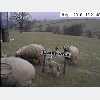| Profile | Posted by | Options | Post Date |

|
Joy
|
Report
|
29 Oct 2008 22:25 |
|
http://www.bbc.co.uk/remembrance/
1918-2008: Ninety Years of Remembrance is a BBC campaign to mark the 90th anniversary of Armistice.
|

|
Phyllis
|
Report
|
30 Oct 2008 18:49 |
|
n
|

|
Izzy
|
Report
|
30 Oct 2008 19:39 |
|
Why are they selling poppies mumy?
Selling poppies in town today.
the poppies child, are flowers of love,
for the men who marched away.
Why have they chosen a poppy mummy?
Why not a beautiful rose?
Because my child, men fought and died,
In the fields where poppies grow.
But why are the poppies so red mumy?
Why are the poppies so red?
Red is the colour of blood my child,
The blood that our soldiers shed.
The heart of the poppy is black mummy,
Why does it have to be black?
Black, my child, is the symbol of grief,
For the men who never came back.
But why mummy, are you crying so?
Your tears are giving you pain.
My tears are my fears for you my child,
For the world is FORGETTING AGAIN.
|

|
Lorraine
|
Report
|
30 Oct 2008 19:44 |
|
My husbands uncle
Richard Derry
killed in action in Korea aged 21
|

|
Joy
|
Report
|
30 Oct 2008 21:09 |
|
http://www.arlingtoncemetery.net/flanders.htm
In Flanders Fields
By: Lieutenant Colonel John McCrae, MD (1872-1918) Canadian Army
IN FLANDERS FIELDS the poppies blow
Between the crosses row on row,
That mark our place; and in the sky
The larks, still bravely singing, fly
Scarce heard amid the guns below.
We are the Dead. Short days ago
We lived, felt dawn, saw sunset glow,
Loved and were loved, and now we lie
In Flanders fields.
Take up our quarrel with the foe:
To you from failing hands we throw
The torch; be yours to hold it high.
If ye break faith with us who die
We shall not sleep, though poppies grow
In Flanders fields.
McCrae's "In Flanders Fields" remains to this day one of the most memorable war poems ever written. It is a lasting legacy of the terrible battle in the Ypres salient in the spring of 1915. Here is the story of the making of that poem:
Although he had been a doctor for years and had served in the South African War, it was impossible to get used to the suffering, the screams, and the blood here, and Major John McCrae had seen and heard enough in his dressing station to last him a lifetime. As a surgeon attached to the 1st Field Artillery Brigade, Major McCrae, who had joined the McGill faculty in 1900 after graduating from the University of Toronto, had spent seventeen days treating injured men -- Canadians, British, Indians, French, and Germans -- in the Ypres salient.
It had been an ordeal that he had hardly thought possible. McCrae later wrote of it: "I wish I could embody on paper some of the varied sensations of that seventeen days... Seventeen days of Hades! At the end of the first day if anyone had told us we had to spend seventeen days there, we would have folded our hands and said it could not have been done."
One death particularly affected McCrae. A young friend and former student, Lieut. Alexis Helmer of Ottawa, had been killed by a shell burst on 2 May 1915. Lieutenant Helmer was buried later that day in the little cemetery outside McCrae's dressing station, and McCrae had performed the funeral ceremony in the absence of the chaplain. The next day, sitting on the back of an ambulance parked near the dressing station beside the Canal de l'Yser, just a few hundred yards north of Ypres, McCrae vented his anguish by composing a poem. The major was no stranger to writing, having authored several medical texts besides dabbling in poetry.
In the nearby cemetery, McCrae could see the wild poppies that sprang up in the ditches in that part of Europe, and he spent twenty minutes of precious rest time scribbling fifteen lines of verse in a notebook.
A young soldier watched him write it. Cyril Allinson, a twenty-two year old sergeant-major, was delivering mail that day when he spotted McCrae. The major looked up as Allinson approached, then went on writing while the sergeant-major stood there quietly. "His face was very tired but calm as we wrote," Allinson recalled. "He looked around from time to time, his eyes straying to Helmer's grave."
When McCrae finished five minutes later, he took his mail from Allinson and, without saying a word, handed his pad to the young NCO. Allinson was moved by what he read:
"The poem was exactly an exact description of the scene in front of us both. He used the word blow in that line because the poppies actually were being blown that morning by a gentle east wind. It never occurred to me at that time that it would ever be published. It seemed to me just an exact description of the scene."
In fact, it was very nearly not published. Dissatisfied with it, McCrae tossed the poem away, but a fellow officer retrieved it and sent it to newspapers in England. The Spectator, in London, rejected it, but Punch published it on 8 December 1915.
http://www.webmatters.net/belgium/ww1_mccrae.htm
On 24 January 1918 he was appointed as the consulting physician to the British Army. That same day he went down with flu and an asthma attack set in. Within 24 hours he had developed a lung infection and he had to be moved to Number 14 British General Hospital for Officers at Wimereux, a small seaside town between Boulogne and Calais.
On 27 January he suffered a brain haemorrhage and slipped into unconsciousness. John McCrae never recovered: on 28 January 1918 he died at the age of 45.
Moina Michael, an American war secretary with the YMCA, was deeply moved by McCrae's work and it was she who first wore a poppy as act of keeping the faith. Others that she had bought she sold to friends, giving the money to Servicemen in need.
Madame Guerin from the French YMCA, inspired by this idea, suggested that artificial poppies should be made and sold to help ex-Servicemen and their dependants.
|

|
Joy
|
Report
|
2 Nov 2008 19:22 |
|
http://www.burmastar.org.uk/epitaph.htm
The Kohima 2nd Division Memorial is maintained by the Commonwealth War Graves Commission on behalf of the 2nd Infantry Division.
The stone is set upright on a dressed stone pedestal, the overall height being 15 feet. A small cross is carved at the top of the monolith and below this a bronze panel is inset. The panel bears the inscription
"When You Go Home, Tell Them Of Us And Say,
For Their Tomorrow, We Gave Our Today"
The words are attributed to John Maxwell Edmonds (1875 -1958), an English Classicist, who had put them together among a collection of 12 epitaphs for World War One, in 1916.
According to the Burma Star Association the words were used for the Kohima Memorial as a suggestion by Major John Etty-Leal, the GSO II of the 2nd Division, another classical scholar.
|

|
Joy
|
Report
|
2 Nov 2008 19:26 |
|
http://www.firstworldwar.com/poetsandprose/binyon.htm
For The Fallen
With proud thanksgiving, a mother for her children,
England mourns for her dead across the sea.
Flesh of her flesh they were, spirit of her spirit,
Fallen in the cause of the free.
Solemn the drums thrill; Death august and royal
Sings sorrow up into immortal spheres,
There is music in the midst of desolation
And a glory that shines upon our tears.
They went with songs to the battle, they were young,
Straight of limb, true of eye, steady and aglow.
They were staunch to the end against odds uncounted;
They fell with their faces to the foe.
They shall grow not old, as we that are left grow old:
Age shall not weary them, nor the years condemn.
At the going down of the sun and in the morning
We will remember them.
They mingle not with their laughing comrades again;
They sit no more at familiar tables of home;
They have no lot in our labour of the day-time;
They sleep beyond England's foam.
But where our desires are and our hopes profound,
Felt as a well-spring that is hidden from sight,
To the innermost heart of their own land they are known
As the stars are known to the Night;
As the stars that shall be bright when we are dust,
Moving in marches upon the heavenly plain;
As the stars that are starry in the time of our darkness,
To the end, to the end, they remain.
Laurence Binyon (1869-1943), the poet and art critic, was born in Lancaster in 1869. He worked at the British Museum before going to war, having studied at Trinity College, Oxford where he won the Newdigate poetry prize. Whilst on the staff of the British Museum he developed an expertise in Chinese and Japanese art.
Aside from his best known poem For The Fallen (1914), most notably the fourth stanza which adorns numerous war memorials, Binyon published work on Botticelli and Blake among others. He returned to the British Museum following the war. His Collected Poems was published in 1931.
|

|
Cyprus
|
Report
|
2 Nov 2008 19:32 |
|
God bless them all xx
|

|
Joy
|
Report
|
7 Nov 2008 14:56 |
|
LEST WE FORGET
|

|
Elisabeth
|
Report
|
8 Nov 2008 11:54 |
|
I have just reserved a book from our local library service, called The Neglected War. It covers the war in Mesopotamia, which is rarely mentioned, though many young men died there.
My father was there from November 1914 - February 1919, wounded 1916, docked 7 days pay for "falling out of line of march" 1917, the following day, hospitalised with malaria. Was there any wonder he was incapable of marching? Spent time in hospital in India, but went back to the battlefield. He thankfully survived and lived to a ripe old age.
I mean to take nothing from the memory of the awful conditions endured in France and Belgium, but there were young men doing their bit, under conditions at the other end of the spectrum, with intense heat, flies and lack of equipment around what is now Iraq.
So few seem to be aware that there was anything else going on besides the war in Europe during WW1.
I will be wearing my poppy with pride tomorrow at our War Memorial and church service, remembering all those who were lost, and those who survived, but with memories too horrific to talk about for the rest of their lives.
We will remember them.
|

|
LindainBerkshire1736004
|
Report
|
8 Nov 2008 15:51 |
|
Remembering all from those terrible times no matter where, abroad and at home too
Linda :o)
|

|
Sue In Yorkshire.
|
Report
|
8 Nov 2008 20:04 |
|
Nameless Man
Around me,when I wake or sleep,
Men strange to me their vigils keep;
And some were boys but yesterday,
Upon the village green at play,
Their faces I shall never know;
Life sentinels they come and go.
In grateful love I bow the knee
For nameless men who die for me.
There is in earth or heaven no room
Where I may flee this dreadful doom.
For ever it is understood
I am a man redeemed by blood.
I must walk softly all my days
Down on my redeemed and solemn ways,
Christ,take the men I bring to Thee,
The men who watch and die for me.
Edward Shillito
In Memory of my uncle Willis Killed in Action 26th September 1917.
Buried ..New Irish Farm Cemetery
Ypres Belguim.
R.I.P Uncle Willis
|

|
Carolyn
|
Report
|
9 Nov 2008 10:59 |
|
In memory of my husband's great uncle, Charles Reader, private in the London Regiment, 13th Kensington Bn, who died 30/12/1917.
Carolyn
|

|
Joy
|
Report
|
9 Nov 2008 16:13 |
|
They shall grow not old, as we that are left grow old:
Age shall not weary them, nor the years condemn.
At the going down of the sun and in the morning
We will remember them.
|

|
powellwestwall
|
Report
|
9 Nov 2008 16:27 |
|
WW1 private James Meredith 10th Battalion
Royal Welsh Fusiliers.
died 27/02/1917. not recovered.
remembered at the Pas De Calais in Arras,
and at Newbridge on Wye. A great uncle found through genes.
|

|
LindainBerkshire1736004
|
Report
|
9 Nov 2008 16:48 |
|
So that we shall never forget
Linda :o)
|

|
LindainBerkshire1736004
|
Report
|
9 Nov 2008 17:23 |
|
Watching Songs of Praise right now.
So moving.
Couldn't get to a service but this brings it right into your own front room
Linda :o)
|

|
Alice in Wonderland
|
Report
|
9 Nov 2008 17:24 |
|
A poem which never fails to move me:
In Memoriam : Ewart Alan Mackintosh
So you were David's father
And he was your only son,
And the new-cut peats are rotting
And the work is left undone,
Because of an old man weeping,
Just an old man in pain,
For David, his son, David
That will not come again.
Oh, the letters he wrote you,
And I can see them still,
Not a word of the fighting,
But just the sheep on the hill
And how you should get the crops in
Ere the year get stormier,
And the Bosches have got his body
And I was his officer
You were only David's father
But I had fifty sons
When we went up in the evening
Under the arch of the guns,
And we came back at twilight
O God! I heard them call
To me for help and pity
That could not help them all.
Oh, never will I forget you
My men that trusted me,
More my sons than your fathers',
For they could only see
The helpless little babies
And the young men in their pride.
They could not see you dying
And hold you when you died.
Happy and young and gallant
They saw their first born go
But not the strong limbs broken
And the beautiful men brought low,
The piteous writhing bodies,
They screamed 'Don't leave me, sir',
For they were only your fathers
But I was your officer.
To all those men who paid the ultimate price - they didn't want to die. Let us remember them.
Alice
|

|
Deb Vancouver (18665)
|
Report
|
10 Nov 2008 19:31 |
|
With thanks to those who served and who are serving for our freedom.
Deb
|

|
Joy
|
Report
|
10 Nov 2008 21:54 |
|
http://www.telegraph.co.uk/news/3399329/Remembrance-Day-Oldest-WWI-survivor-Henry-Allingham-to-lead-commemorations.html?mobile=true
Henry Allingham, 112, will be joined by Harry Patch, 110 and William Stone 108, the only other known surviving veterans of the Great War in Britain, at the Cenotaph in London on Tuesday Nov 11 for a service of remembrance.
They are the last three, from more than five million Britons who bore arms when the Armistice was signed exactly 90 years before.
It will almost certainly be the last major anniversary of the First World War at which a living link with that generation will be present.
For Mr Allingham, who served with the Royal Naval Air Service and later the RAF, it will be an ordeal but one he feels he must endure as a personal tribute to those he knew.
"I don't look forward to it," he said. "I'm glad that I'm able to do something to serve those men who did so much for me, and all of us. That's what I want everybody to know and understand."
|

